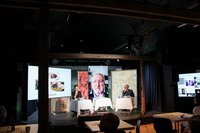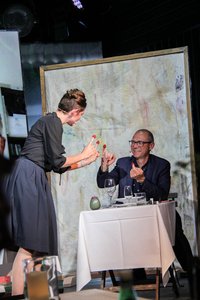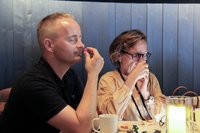Session 2 - THE TASTER
Is the pleasure we experience through taste odious, or can taste experiences also be means for pleasure in a sustainable future? When we as consumers choose sustainability as a quality mark what happens to taste? What do we know about consumers and their practices of using, re-using or wasting food products – and taste as lifestyle? These reflections layed the ground for the central topic of session two "The taster", with the guiding question: How can individual taste preferences meet the demand for sustainability?
Artist and eating designer Marije Vogelzang was invited to mediate the discussion on this topic between sensory scientist Michael Bom Frøst and Professor of philosophy Barry C. Smith (participating virtually).
In the video, you can watch session 2, full lenght. Enjoy!
Barry C Smith
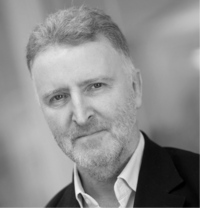
Professor Barry C. Smith has been Director of the Institute of Philosophy at the School of Advanced Study, University of London since 2008 and is the founding director of the Centre for the Study of the Senses, which pioneers collaborative research links between philosophers, psychologists and neuroscientists. He has published on the emotions, the perception of taste and on self-knowledge. In November 2012, Barry was appointed AHRC Leadership Fellow for the Science in Culture Theme. As part of this role he will provide intellectual and strategic leadership for the further development of the Science in Culture Theme and work closely with senior AHRC Programmes staff to develop partnerships within and beyond academia. He is a frequent broadcaster and recently wrote and presented a 10-part series for BBC Radio 4, The Uncommon Senses.
Marije Vogelzang
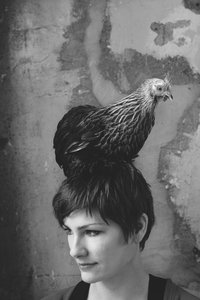
Eating designer and artist Marije Vogelzang is known for her creative ways of using food experiments and art to challenge the way we feel and interact.
Focusing on the verb “eating” rather than food in itself, Vogelzang explores rituals, cultural behavior and the manufacturing of food to pinpoint how food is not only something we consume but something that connects us
Michael Bom Frøst

Frøst is a sensory scientist working with Food Design Thinking. His main research interest is how we balance sensory, functional and reflective input in our appreciation of foods. According to Frøst, this can be used to develop new foods that speak both to our senses, body and mind. He develops and applies sensory methods to real world setting, to empower food innovators to develop foods under constraints. Frøst works at Department og Food Science at University of Copenhagen.
